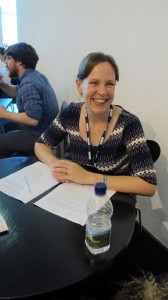So, I am all Free Thunk! What a fantastic weekend in Gateshead with the BBC team and my fellow New Generation Thinkers. Speed dating was a heady, super-charged, intellectual comedy with the lovely Ian McMillan hooting the hooter in his own inimicable style. I came runner up each day with my idea that we should have a National Fool to keep us all honest! In slightly more serious proceedings, my discussion of Zamyatin’s dark dystopia We and the contemporary issues we are all facing around surveillance and questions of privacy, security and freedom was broadcast last night on BBC Radio 3. I was lucky enough to participate alongside a trio of the best in the business – David Aaronovitch, Sean O’Brien and Matthew Sweet. If you didn’t catch it last night, you can listen again here.
And here’s me trying to win over the love and votes of the Speed Dating public!

